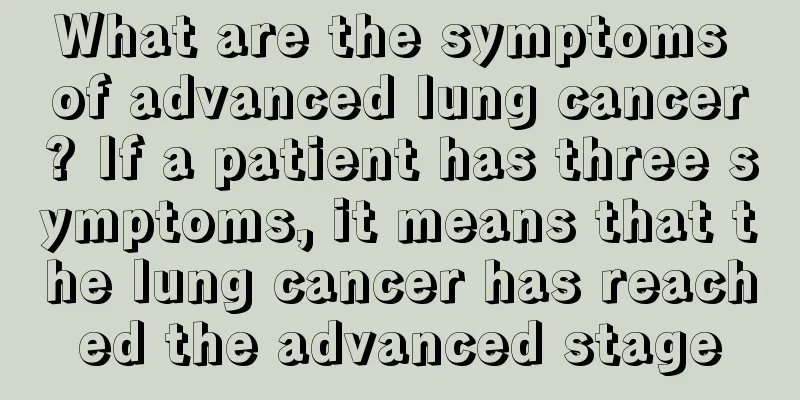Can acute cerebral hemorrhage be cured?

|
Acute cerebral hemorrhage is a very serious disease. Mild cases can be cured through surgery or medication, but if the bleeding is deep, it will leave serious sequelae even if treated. Acute cerebral hemorrhage occurs very suddenly, and if it is not treated, the patient's life will be in danger within a short period of time. Therefore, first aid measures during the onset of the disease are essential skills for family members. Sudden cerebral hemorrhage is an acute cerebral hemorrhage. If the bleeding site is relatively superficial and the amount of bleeding is small, it can be cured through conservative treatment or surgical treatment. However, for patients with deeper bleeding sites and larger amounts of bleeding, serious disability and other symptoms may still remain after rescue. First aid measures in case of illness 1. Keep the airway open The head of a comatose patient should be placed in a side position rather than a supine position to prevent the tongue from falling back and blocking the airway. Turn over and pat the back in time to facilitate coughing up of sputum. At the same time, suction the sputum frequently or inhale it through nebulization to facilitate the humidification of the sputum. When there are signs of respiratory obstruction, tracheotomy should be performed in time to avoid hypoxia and aggravation of cerebral edema. You can breathe oxygen mixed with 5% carbon dioxide intermittently. Try to avoid inhaling pure oxygen for too long, because pure oxygen can cause cerebral vasospasm and even oxygen poisoning. 2. Maintain nutrition and water and electrolyte balance It is usually better to fast within the first 1 to 2 days of onset. The daily infusion volume should be 1500 to 2000 ml, and the intake and output should be recorded. Large doses of dehydrating agents should be used, and attention should be paid to potassium supplementation. In addition, attention should be paid to preventing and correcting acidosis, non-ketotic diabetes, and hyperosmolar coma. For those who are in a coma or unable to eat, a nasogastric tube can be inserted on the third day to feed fluid to ensure nutritional supply. Appropriately limit fluid intake, generally not more than 2500ml per day. If there is high fever, vomiting, sweating, excessive diuresis, etc., it can be increased as appropriate. Avoid using high-sugar liquids, and give fat emulsion injection (fat emulsion), human serum albumin, amino acids or energy mixtures when necessary. 3. Strengthen nursing care Patients with cerebral hemorrhage develop the disease rapidly, are in critical condition, and have a high mortality rate. Therefore, acute care is crucial. Closely observe the patient's condition: including consciousness, pupil changes, vomiting, and monitor blood pressure and body temperature changes. Prevention of complications: The main factor affecting the treatment and prognosis of acute cerebrovascular disease is the prevention of complications. Preventing urinary tract infections and bedsores is the focus of nursing. |
<<: How to relieve knee pain after exercise
>>: What to do if you have a headache after catching a cold head
Recommend
There is a lump on the right side of the chin
The phenomenon of a hard lump on the right side o...
What are the complications after bladder cancer surgery
Complications after bladder cancer surgery usuall...
Which kind of mask can protect against pm2.5
If it is an ordinary mask, it can only block sali...
Pain below left shoulder and above chest
In daily life, people use their arms to move and ...
How to control frequent blushing
Frequent blushing may be caused by both physiolog...
What is the life expectancy of patients with grade 3 hepatocellular carcinoma? Surgery should be considered again
Hepatocellular carcinoma is a very harmful diseas...
What are the benefits of taking an orange peel bath?
People often add some flower petals or white vine...
What foods should lung cancer patients eat? Several dietary taboos for lung cancer
Lung cancer is a very common disease. Patients ar...
Can thyroid cancer cause grunting?
Thyroid cancer generally does not cause gurgling,...
Is it good to drink honey water for high blood pressure?
There are many patients with hypertension in my c...
How to use bb cream and foundation
Many makeup novices don't know how to use BB ...
How long does it take to cook green shrimps?
Green shrimps are a very delicious kind of shrimp...
Is reverse abdominal breathing harmful to humans?
If reverse abdominal breathing is not mastered we...
What is the reason for pain in the middle of the abdomen
There are many reasons for abdominal pain, which ...
The TOP 10 afternoon teas you can’t miss
Afternoon tea "originated" in China? Yo...









